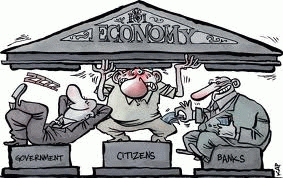The share of our national income which goes to corporate profit is the highest it's been since they started tracking it in 1929, while the share going to people -- as salary and wages -- is the lowest. And the percentage of that corporate profit which goes to Wall Street is also the highest on record.
We're becoming a financialized economy. Never before has the manipulation of money counted for so much and the real-world economy of people and consumer goods counted for so little.
And none of it is an accident.
When Wall Street catches a cold ...
The Wall Street Journal reported this Thursday that "Stock and bond prices tumbled after stronger-than-expected economic data ..."
Why would good news about the economy cause the stock market to fall? The sentence continues: "... raised investor anxiety about a pullback next month in central-bank support for financial markets... "
Investors had been relying on the Federal Reserve to keep pumping up the stock market's record run, but some mildly favorable economic reports raised fears that the Fed's market-friendly interventions might come to an end.
"We're getting another knee-jerk reaction to fears of tapering," a market analyst told the Journal, referring to the Fed's monthly purchase of $85 billion in bonds. As Reuters reported last month, "Many on Wall Street believe the Federal Reserve's monetary policy is behind record corporate earnings and the stock market's surge to all-time highs this year."
When Wall Street catches a cold -- when it even might catch a cold -- the economy catches pneumonia.
Reality Bites
Meanwhile, the "real" economy -- the one where people live, and work, and buy things -- has suffered even as Wall Street and the stock market have boomed. That trend continued this week, too, Wal-Mart announced disappointing sales and lowered its projections. Its Chief Financial Officer observed that "The retail environment remains challenging in the U.S. and our international markets, as customers are cautious in their spending."
Cisco also lowered its sales expectations. As the Journal article notes, these announcements added to the fear that the Fed's interventions might wind down.
This stock market story illustrates the gulf between a stock-market economy increasingly driven by the banking industry -- an economy which has been booming, today's news notwithstanding -- and a human economy wracked by consumer fears, falling wages, joblessness, and low-level jobs for a growing number of people who are working.
The gulf between these two economies drove this morning's stock market story. It's also driving the long-term depression-like misery which holds millions of Americans in its grip.
This is not the playing out of some divinely decreed order. The financialization of the U.S. economy is the result of very deliberate governmental choices. Unless different choices are made going forward, we will continue to become a "Bankistan" whose wealth and economic fate is increasingly hijacked by Wall Street.
(Note: You can view every article as one long page if you sign up as an Advocate Member, or higher).






